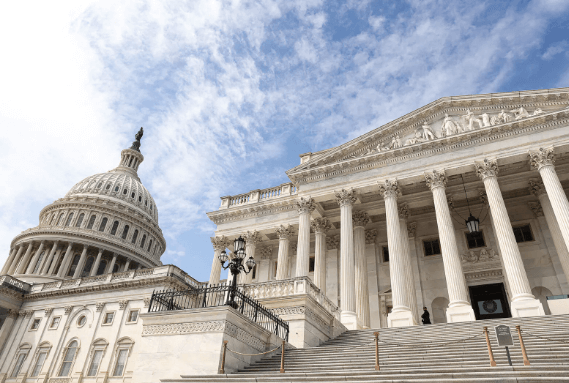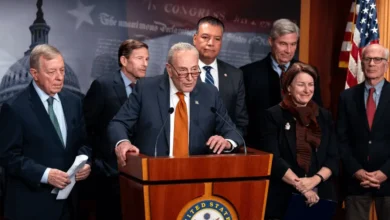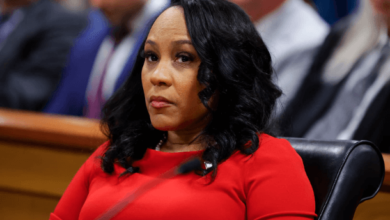U.S. Supreme Court Declines to Hear Challenge Against Alaska’s Campaign Finance Law: What This Means for Free Speech and Political Transparency

Introduction
In a notable decision on Monday, the U.S. Supreme Court chose not to hear a challenge to Alaska’s campaign finance law. The plaintiffs argued that the law, which includes stringent disclosure rules, violated free speech rights under the First Amendment. The court’s refusal to take up the case effectively upholds Alaska’s voter-approved initiative aimed at increasing transparency in political donations. This article delves into the implications of the Supreme Court’s decision, the background of the case, and its potential impact on campaign finance reform in other states.
Understanding Ballot Measure 2: A Push for Transparency
What is Ballot Measure 2? Passed narrowly by Alaskan voters in 2020, Ballot Measure 2 was a sweeping reform designed to overhaul the state’s election system. The measure introduced:
- Non-partisan open primaries: Allowing all candidates to run in a single primary, with the top four advancing to the general election.
- Ranked-choice voting: A system that lets voters rank candidates by preference in the general election.
- Stricter disclosure requirements: To address the growing influence of “dark money” — funds spent on political campaigns without disclosing the sources of those contributions.
See also: Democrats Urge Biden to Sanction Israeli Officials Over West Bank Violence
The Controversy Surrounding Dark Money
“Dark money” refers to political spending by organizations that do not disclose their donors. This lack of transparency allows powerful interests to influence elections and legislation without accountability.
Ballot Measure 2 aimed to curb the influence of dark money by requiring any individual contributing $2,000 or more annually to organizations involved in political campaigns to disclose their donations within 24 hours. Failure to comply could result in fines of up to $1,000 per day.
The Legal Battle: Free Speech vs. Transparency
Who Filed the Challenge? The legal challenge was spearheaded by the Liberty Justice Center, a conservative advocacy group representing Alaskan residents and organizations. They argued that the new disclosure rules violated the First Amendment, which guarantees the right to free speech, including the right to anonymously support political causes.
Key Arguments of the Plaintiffs:
- Chilling Effect: The plaintiffs contended that forcing donors to disclose their identities could deter individuals from contributing to political causes, fearing public backlash or potential harassment.
- Infringement on Free Speech: They argued that requiring disclosure of contributions was tantamount to restricting political speech, which is protected under the First Amendment.
The State’s Defense: Alaska defended the law by arguing that the state’s interest in ensuring transparency in elections outweighs the free speech concerns. According to state officials, the measure aims to protect the integrity of the electoral process by ensuring voters are aware of the sources of campaign funding.
Lower Courts’ Rulings and the Supreme Court’s Decision
What Did Lower Courts Decide? Before reaching the Supreme Court, lower courts upheld Alaska’s law, ruling that the state’s transparency requirements did not unconstitutionally infringe upon free speech rights. They emphasized that disclosure rules serve a compelling public interest by promoting transparency in the political process.
Supreme Court’s Refusal to Hear the Case The Supreme Court’s decision to decline the appeal leaves the lower court rulings in place. This move is significant as it indicates a willingness to let states experiment with measures designed to enhance transparency in campaign finance.
Impact of the Decision: A Precedent for Other States?
Echoes of Citizens United The case is reminiscent of the Citizens United v. FEC decision in 2010, where the Supreme Court struck down restrictions on corporate and union spending in elections, citing free speech rights. However, unlike Citizens United, which led to a surge in political spending by outside groups, Alaska’s law takes a different approach by focusing on transparency rather than outright restrictions.
Potential Influence on Other States By upholding Alaska’s disclosure requirements, the Supreme Court has potentially set a precedent for other states considering similar reforms. States like California, Colorado, and New York may be inspired to enact their own measures to increase transparency in political donations.
The Broader Debate: Balancing Free Speech and Public Interest
Supporters of Alaska’s Law Proponents of the law argue that transparency is crucial to a healthy democracy. They believe that knowing the sources of political contributions allows voters to make more informed decisions, reducing the risk of undue influence by powerful, undisclosed entities.
Opponents’ Concerns On the other hand, critics assert that disclosure rules could discourage people from supporting causes they believe in due to fear of public backlash. They argue that the First Amendment protects not just the right to free speech, but also the right to support causes anonymously.
FAQs
1. What is the purpose of Ballot Measure 2 in Alaska? Ballot Measure 2 aims to increase transparency in political donations, introduce a non-partisan primary system, and implement ranked-choice voting to enhance voter participation and reduce the influence of dark money.
2. Why did the Liberty Justice Center challenge the law? The Liberty Justice Center argued that the disclosure requirements infringed on the First Amendment rights of donors, potentially deterring them from supporting political causes due to fear of backlash.
3. How does the Supreme Court’s refusal to hear the case affect Alaska’s law? By refusing to take up the case, the Supreme Court effectively leaves the lower court’s rulings in place, upholding the disclosure requirements.
4. Could this decision impact other states? Yes, this decision may encourage other states to adopt similar transparency measures to combat dark money in politics.
5. How does this compare to the Citizens United ruling? While Citizens United allowed for unlimited political spending by corporations and unions, Alaska’s law focuses on transparency rather than restrictions, requiring disclosure of contributions above a certain threshold.
6. Are there penalties for not complying with Alaska’s disclosure rules? Yes, individuals or organizations that fail to disclose qualifying donations within 24 hours can face fines of up to $1,000 per day.
Conclusion
The Supreme Court’s refusal to hear the challenge against Alaska’s campaign finance law underscores the complex balancing act between protecting free speech and promoting transparency in elections. As states continue to grapple with the influence of dark money, Alaska’s approach may serve as a model for reform efforts across the country. By prioritizing transparency, voters can have greater confidence in the integrity of the political process.



